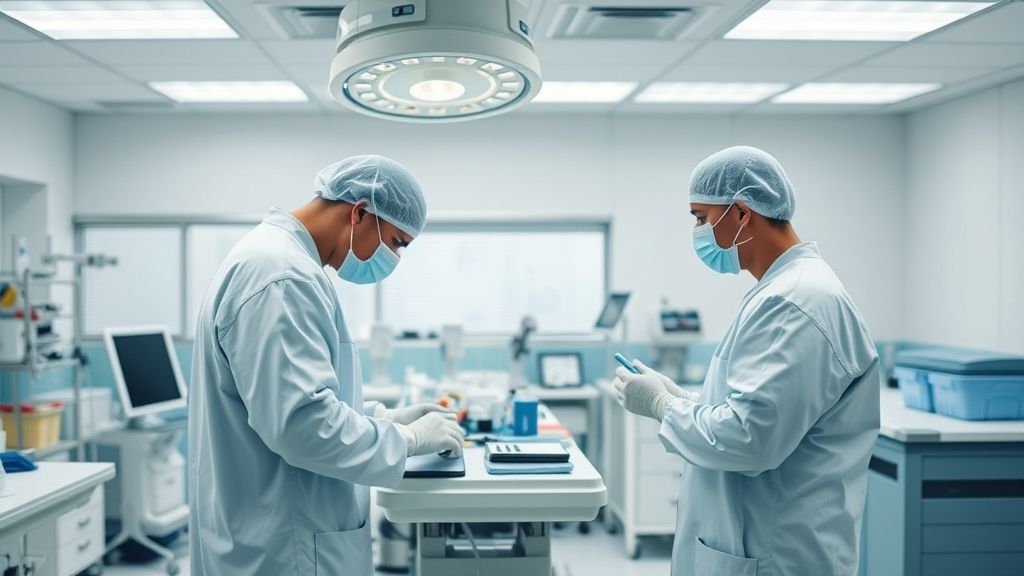Md. Al-Amin
Robo Orion

Advanced biotechnology lab with DNA sequencing equipment
The biotechnology industry is experiencing unprecedented innovation with breakthroughs in gene therapy, CRISPR technology, alternative proteins, and personalized medicine transforming healthcare and food systems. These advancements promise to address some of humanity's most pressing challenges, from genetic disorders to sustainable food production.
Revolutionary Gene Therapy Advancements
Gene therapy has transitioned from experimental concept to clinical reality, with groundbreaking treatments now available for previously untreatable genetic conditions. The FDA's approval of novel therapies for sickle cell disease and beta-thalassemia represents a milestone in genetic medicine.
CRISPR-Based Therapeutics
The precision of CRISPR gene editing technology has improved dramatically, with newer versions like base editing and prime editing offering more accurate DNA modifications with reduced off-target effects. Clinical trials for CRISPR-based therapies have shown remarkable success in treating genetic blood disorders, with some patients remaining symptom-free years after treatment.
Recent Success Stories:
- First FDA-approved CRISPR therapy for sickle cell disease showing 96% success rate
- Gene therapy restoring vision in patients with inherited retinal diseases
- Novel approaches for neurological disorders like Huntington's and ALS
Alternative Proteins: Transforming Food Systems
The alternative protein sector has expanded beyond plant-based burgers to include cultivated meat and precision fermentation products that closely mimic animal-based foods. These innovations address environmental concerns while meeting global protein demands.
Cellular Agriculture Breakthroughs
Companies are now producing lab-grown meat at significantly lower costs, with some products already receiving regulatory approval in multiple countries. The field has seen dramatic improvements in scaling production and reducing reliance on fetal bovine serum, making ethical meat consumption increasingly accessible.
Environmental Impact:
Cultivated meat production requires up to 90% less land and water than traditional livestock farming while reducing greenhouse gas emissions by 75-95%. These efficiencies make cellular agriculture a critical component of sustainable food systems.
Personalized Medicine and Diagnostics
Advances in genomic sequencing and AI-powered analysis are enabling truly personalized treatment approaches. Liquid biopsies can now detect multiple cancer types at early stages from simple blood draws, revolutionizing cancer screening.
AI in Drug Discovery
Artificial intelligence is accelerating drug development, with algorithms capable of predicting molecular behavior and identifying potential drug candidates in days rather than years. This approach has proven particularly valuable during recent global health crises, enabling rapid development of targeted therapies.
The Future of Biotechnology
As these technologies converge, we're entering an era of unprecedented possibilities in healthcare and sustainability. Gene therapies are becoming more accessible, alternative proteins are approaching price parity with conventional options, and diagnostic tools are becoming increasingly precise and non-invasive.
Key Trends to Watch:
Multi-Gene Therapies
Treatments targeting multiple genetic factors simultaneously
Cultivated Seafood
Lab-grown fish and shellfish to address overfishing
Neurotechnology
Interfaces connecting brains with computers for medical applications
RNA Therapeutics
Beyond mRNA vaccines to treatments for various conditions
Ethical Considerations and Regulation
As biotechnology advances, ethical frameworks and regulatory policies must evolve accordingly. Issues around genetic privacy, equitable access to advanced therapies, and environmental impacts of new technologies require careful consideration and inclusive dialogue.
Important Consideration: While biotech innovations offer tremendous potential, responsible development requires addressing ethical concerns, ensuring equitable access, and maintaining rigorous safety standards through appropriate regulatory oversight.
Conclusion: The Biotech Revolution Continues
The pace of biotechnological innovation shows no signs of slowing, with breakthroughs in gene editing, alternative proteins, and personalized medicine transforming our approach to health and sustainability. These advancements promise to address global challenges while creating new economic opportunities.
As these technologies mature, collaboration between researchers, regulators, industry leaders, and the public will be essential to ensure that biotech innovations benefit all of humanity while minimizing potential risks.